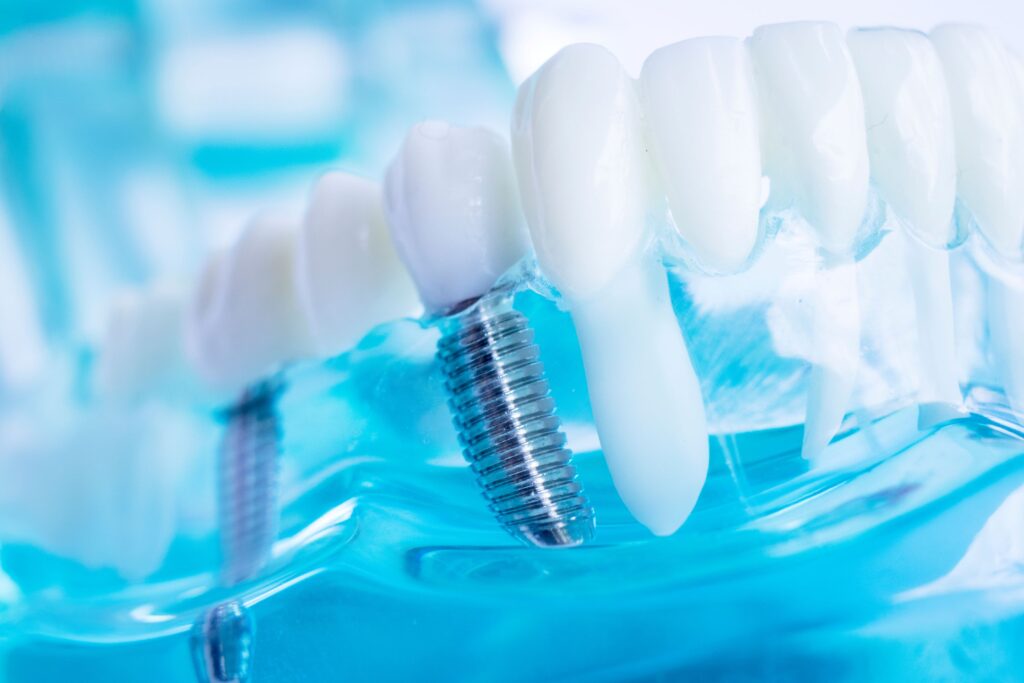
Dental implants continue to gain popularity as a reliable way to replace missing teeth because of their many unique benefits. Unlike dental bridges and dentures, these restorations include surgically embedding a metal pole in your jaw to function like a root, providing additional strength and stability.
However, your new teeth are not completely invincible, and many patients question how durable they are and how long they usually last. If you’re curious, continue reading to learn more about the longevity of dental implants!
What Are the Parts of Dental Implants?
There are three main components of dental implants, and the materials they’re made from can impact their resilience. The different parts are:
- The implant. This metal rod placed in your jawbone is often made from titanium because it’s both strong and lightweight, but zirconia is also sometimes used.
- The abutment. This in-between piece anchors your replacement tooth to the pole that’s surgically inserted into your jaw.
- The restoration. For a single tooth, a dental crown made of ceramic is used to close the gap in your grin, but two or more rods can hold dental bridges or dentures to replace multiple missing teeth.
How Long Do Dental Implants Usually Last?
The lifespan of your new tooth depends significantly on your unique circumstances. They can last anywhere from 15 to 25+ years, though it depends on what they’re made from and how well you care for them.
For instance, it can take three to six months to heal after your procedure because your jaw must produce enough new bone growth to fuse with the metal rod of your implant. This makes it a permanent part of your smile that isn’t likely to require repairs or replacement as long as you follow your provider’s post-op instructions.
The porcelain restoration might not last as long, however, because it can be damaged or worn down from everyday use. This tooth-shaped portion might require repairs or replacement after about 10 to 15 years.
How Can I Prevent Dental Implant Failure?
This treatment has an incredibly high success rate of more than 90%, but if you’re not careful, your implant could fail. You can keep it looking and feeling great by:
- Implementing a routine. Your prosthetic can’t get cavities, but the leading cause of failure is a form of gum disease called peri-implantitis. This can be avoided by brushing and flossing twice daily to remove plaque and bacteria.
- Eating carefully. Avoid overly hard, sticky, or crunchy foods that might chip, crack, push, or yank your new tooth, which can destabilize it or contribute to additional injuries and infection.
- Quitting bad habits. Alcoholic beverages can dissolve the cement anchoring your crown to the abutment, which can dislodge it, and smoking tobacco products can cause failure even years after their successful placement.
- Scheduling follow-ups. You should visit your dentist every six months for a routine checkup and cleaning so they can identify and address areas of concern, like swollen gums, before your new tooth is affected.
If you still have questions about what to expect from your dental implants, the best way to get accurate answers is to ask your dentist directly!
About the Practice
At Norton Family Dentistry, people of all ages benefit from a team of dentists dedicated to helping them build and maintain happy, healthy smiles. Dr. Salloum, Dr. Devine, and Dr. Thomas collaborate to provide a comprehensive menu of services at one convenient location, including dental implants. Their welcoming office environment is equipped with state-of-the-art technology to complete each step of the process onsite, including oral surgery. Then, they provide lifelike restorations designed to match your natural grin for seamless results. You can request an appointment on the website or call (508) 226-1686.



